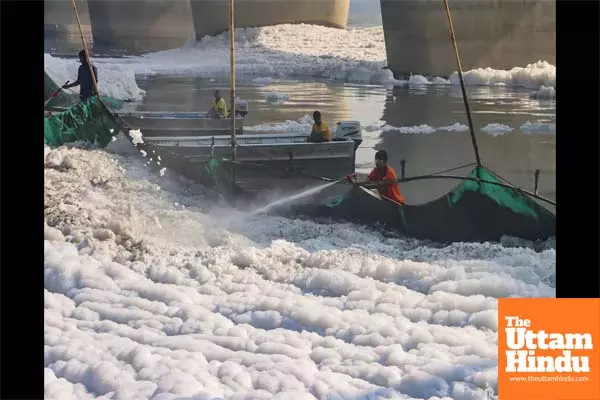
Toxic foam on Yamuna raises concerns as Chhath Puja begins in Delhi

New Delhi (The Uttam Hindu): As the four-day Chhath festival begins with the traditional 'Nahay Khay' on Tuesday, a disturbing sight marred the religious fervour along the banks of the Yamuna River near Kalindi Kunj in Delhi. Devotees gathered in large numbers to offer prayers and perform the ritual holy bath, a significant part of the festival dedicated to the Sun God. However, their devotion was overshadowed by the sight of toxic foam floating on the river's surface, a stark reminder of the city’s persistent pollution woes.
Amid the rising pollution levels that have plagued the national Capital, sections of the Yamuna River, particularly around Kalindi Kunj, were seen covered in thick, frothy foam, leaving both environmentalists and devotees concerned. As the festival enters its first day, the foam — an unpleasant and potentially hazardous byproduct of chemical pollution— has once again raised an alarm about the state of the river, which is central to the Chhath Puja rituals. Each year, devotees of Chhath Puja gather by the Yamuna to perform sacred bathing and prayers as part of the traditional worship. However, this year, the sight of foam on the river’s surface has led many to question the efficacy of the measures taken by the administration to address the growing pollution problem.
The foam, a result of untreated sewage and industrial waste being dumped into the river, has become an annual issue during the festival, yet no lasting solutions seem to have been implemented. “I love the Yamuna River, and I have come here to take a bath on Chhath Vrat, but the condition of the river is very bad. It feels very unfortunate,” said Kiran, a devotee who had travelled to the riverbank for the ritual. “The government should think about the state of the river that we hold in reverence and worship. It's disgraceful that the water we are supposed to bath in is polluted water,” she said. Another devotee, Ram Dulari, who was also performing the traditional bath, echoed similar sentiments. “Today is Nahay Khay, the first day of our Chhath Puja. I just want to request the government to clean the Yamuna River,” she said, visibly distressed by the condition of the water. The toxic foam, which has become a recurring issue during festivals like Chhath Puja, raises serious concerns about the quality of the water and its potential impact on public health.
The foam is composed of harmful chemicals, detergents, and pollutants from industrial and domestic waste. Prolonged exposure to such polluted water can lead to skin irritations and other health risks, especially for those who wade into the river to perform rituals. This scene of environmental degradation in the Yamuna also highlights the systemic issue of untreated sewage being discharged into the river, which has been an ongoing challenge for years. The river’s pollution levels have reached alarming proportions, with high concentrations of chemicals and industrial waste dissolving into the water, further complicating efforts to clean it.
Despite the Delhi government’s repeated assurances of measures to tackle the pollution in the Yamuna, the situation seems to have worsened over time. The lack of effective intervention during major religious events like Chhath Puja raises questions about the sincerity of the administration's efforts to improve water quality and safeguard public health. Environmental experts have long been warning about the dangers posed by the river’s contamination. The foam, which forms as a result of chemical and organic waste, serves as a visual indicator of the severe pollution in the water, which is not only harmful to the devotees but also to the broader ecosystem. The ongoing pollution of the Yamuna, especially during such important cultural and religious events, has now become a significant challenge for the government and local authorities. Devotees, who hold the river in high regard, are increasingly frustrated with the lack of progress in cleaning the waterway.

